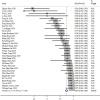A meta-analysis of accuracy and sensitivity of chest CT and RT-PCR in COVID-19 diagnosis
- PMID: 33372194
- PMCID: PMC7769992
- DOI: 10.1038/s41598-020-80061-2
A meta-analysis of accuracy and sensitivity of chest CT and RT-PCR in COVID-19 diagnosis
Abstract
Nowadays there is an ongoing acute respiratory outbreak caused by the novel highly contagious coronavirus (COVID-19). The diagnostic protocol is based on quantitative reverse-transcription polymerase chain reaction (RT-PCR) and chests CT scan, with uncertain accuracy. This meta-analysis study determines the diagnostic value of an initial chest CT scan in patients with COVID-19 infection in comparison with RT-PCR. Three main databases; PubMed (MEDLINE), Scopus, and EMBASE were systematically searched for all published literature from January 1st, 2019, to the 21st May 2020 with the keywords "COVID19 virus", "2019 novel coronavirus", "Wuhan coronavirus", "2019-nCoV", "X-Ray Computed Tomography", "Polymerase Chain Reaction", "Reverse Transcriptase PCR", and "PCR Reverse Transcriptase". All relevant case-series, cross-sectional, and cohort studies were selected. Data extraction and analysis were performed using STATA v.14.0SE (College Station, TX, USA) and RevMan 5. Among 1022 articles, 60 studies were eligible for totalizing 5744 patients. The overall sensitivity, specificity, positive predictive value, and negative predictive value of chest CT scan compared to RT-PCR were 87% (95% CI 85-90%), 46% (95% CI 29-63%), 69% (95% CI 56-72%), and 89% (95% CI 82-96%), respectively. It is important to rely on the repeated RT-PCR three times to give 99% accuracy, especially in negative samples. Regarding the overall diagnostic sensitivity of 87% for chest CT, the RT-PCR testing is essential and should be repeated to escape misdiagnosis.
Conflict of interest statement
The authors declare no competing interests.
Figures







References
-
- Organization, W. H. Coronavirus disease 2019 ( COVID-19): situation report, 92 (2020).

